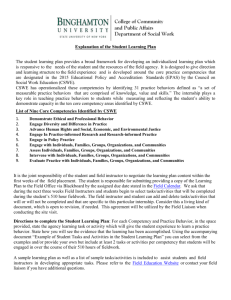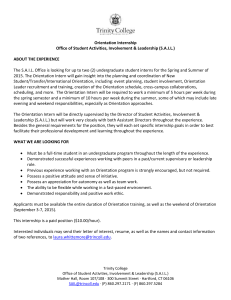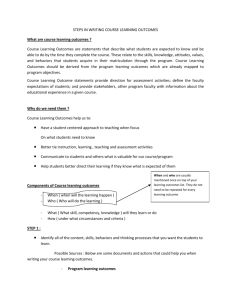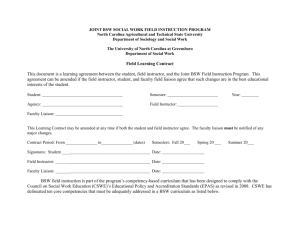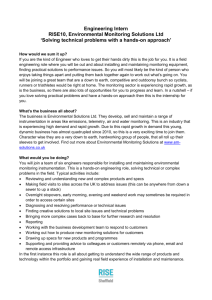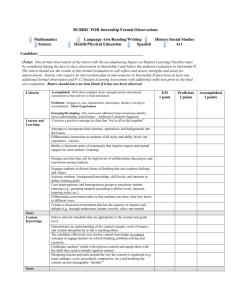JMSW Advanced Internship Learning Agreement This document is a
advertisement
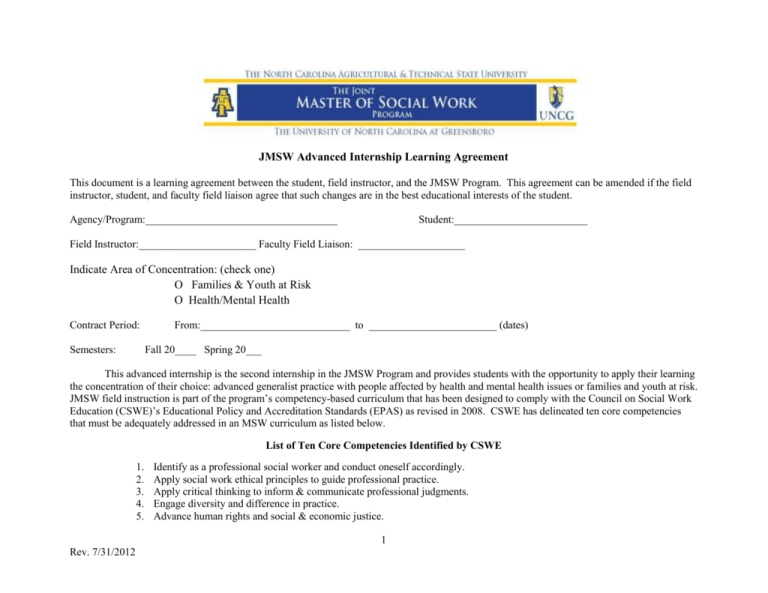
JMSW Advanced Internship Learning Agreement This document is a learning agreement between the student, field instructor, and the JMSW Program. This agreement can be amended if the field instructor, student, and faculty field liaison agree that such changes are in the best educational interests of the student. Agency/Program:____________________________________ Student:_________________________ Field Instructor:______________________ Faculty Field Liaison: ____________________ Indicate Area of Concentration: (check one) O Families & Youth at Risk O Health/Mental Health Contract Period: Semesters: From:____________________________ to ________________________ (dates) Fall 20____ Spring 20___ This advanced internship is the second internship in the JMSW Program and provides students with the opportunity to apply their learning the concentration of their choice: advanced generalist practice with people affected by health and mental health issues or families and youth at risk. JMSW field instruction is part of the program’s competency-based curriculum that has been designed to comply with the Council on Social Work Education (CSWE)’s Educational Policy and Accreditation Standards (EPAS) as revised in 2008. CSWE has delineated ten core competencies that must be adequately addressed in an MSW curriculum as listed below. List of Ten Core Competencies Identified by CSWE 1. 2. 3. 4. 5. Identify as a professional social worker and conduct oneself accordingly. Apply social work ethical principles to guide professional practice. Apply critical thinking to inform & communicate professional judgments. Engage diversity and difference in practice. Advance human rights and social & economic justice. 1 Rev. 7/31/2012 6. Engage in research-informed practice and practice-informed research. 7. Apply knowledge of human behavior and the social environment. 8. Engage in policy practice to advance social and economic well-being and to deliver effective social services. 9. Respond to contexts that shape practice. 10. Engage, assess, intervene and evaluate with individuals, families, groups, organizations and communities. CSWE defines each competency as “a set of measurable practice behaviors that are comprised of knowledge, values, and skills.” Programs are expected to identify advanced practice behaviors related to these competencies for the concentration(s) they offer. JMSW faculty have identified 17 advanced practice behaviors related to each of the two concentrations. The JMSW field instruction program is considered the signature pedagogy in this new competency based curriculum. The signature pedagogy represents the central form of instruction and learning in which a profession socializes its students to perform the role of practitioner. Both this JMSW Advanced Internship Learning Agreement and the JMSW Advanced Internship Evaluation contain the list of the 17 practice behaviors (organized under the ten core competencies) that are to be addressed through planned tasks on this form and evaluated at the completion of each semester of the internship on the evaluations form. Field instructors and students should download the Suggested Learning Activities for Competency Development in Field Internships from www.jmsw.org under the Field link to utilize as they develop the field task plan for the attainment of these 17 practice behaviors. This information can be used to guide the development of an individual student’s learning experiences in a specific agency setting and should always be developed in collaboration with the student’s field instructor. At the end of the internship, the field instructor will complete the Advanced Internship Evaluation, using the rating scale on the next page to evaluate a student’s performance of each practice behavior. Field instructors will also be asked to provide an overall summary of the student’s performance during this internship and review the entire evaluation report with the student. The overall summary section is on the first page of the internship evaluation form. The field instructor and the student should always consult the faculty field liaison for any questions that arise in regard to either this internship agreement or the internship evaluation. In addition, field instructors should refer to the JMSW Advanced Internship Task Plan as they complete the evaluation on a student at the end of each semester. 2 Rev. 7/31/2012 Rating Scale for the 17 JMSW Advanced Practice Behaviors 4=Excellent performance of the practice behavior 3=Satisfactory performance of the practice behavior 2=Marginal performance of the practice behavior 1=Poor/Failing performance of the practice behavior* 0=Not demonstrated or no opportunity to perform practice behavior *As soon as a field instructor identifies that a student is performing at a poor/failing level for one and/or more practice behaviors, he/she should first address this issue in supervision with the student. However, if this discussion, along with other supportive/instructive strategies, does not result in any apparent changes in the student’s performance then the faculty field liaison should be contacted immediately so a review meeting can be set up. This review meeting should include the student, field instructor, and faculty field liaison. Typically, such a meeting will result in the delineation of a correction plan where the student will be given specific written directions as to how to improve his/her performance in the internship with a re-evaluation date. Students who are concerned about their performance in terms of any one of these 17 practice behaviors are strongly encouraged at any point during their internship to ask their field instructor for feedback during their weekly supervision sessions. Signature of Student:_______________________________________________________ Date:_______________ Signature of Field Instructor:________________________________________________ Date:_______________ Signature of Field Liaison:__________________________________________________ Date:_______________ 3 Rev. 7/31/2012 JMSW Advanced Internship Task Plan (1) (2) (3) Competency EP 2.1.1: Intern identifies as a professional social worker and conducts himself/herself accordingly Articulate the social work knowledge, values, and skills related to practice with people affected by health/mental health issues or families and youth at risk. Tasks to Address Practice Behaviors Competency EP 2.1.2.: Intern applies social work ethical principles to guide his or her professional practice. Apply social work ethical principles to advanced professional practice. Tasks to Address Practice Behaviors Competency EP 2.1.3.: Intern applies critical thinking to inform and communicate professional judgments. Use conceptual frameworks, theory, and knowledge to understand behavior and context and to inform practice with people affected by health/mental health issues or families and youth at risk. Tasks to Address Practice Behaviors 4 Rev. 7/31/2012 (4) (5) (6) (7) Competency EP 2.1.4.: Intern engages diversity and difference in practice. Incorporate an understanding of cultural context in social work practice with people affected by health/mental health issues or families and youth at risk. Tasks to Address Practice Behaviors Demonstrate leadership in promoting cultural competency in organizational contexts. Competency EP 2.1.5.: Intern advances human rights and social and economic justice. Advocate at multiple levels to reduce disparities for oppressed groups. Tasks to Address Practice Behaviors Competency EP 2.1.6.: Intern engages in research-informed practice and practice-informed research. Critically appraise and apply research findings to advanced practice. Tasks to Address Practice Behaviors 5 Rev. 7/31/2012 (8) (9) (10) (11) Evaluate client outcomes in advanced practice. Competency EP 2.1.7.: Intern applies knowledge of human behavior and the social environment. Synthesize and apply bio-psychosocial and spiritual theories to advanced practice with people affected by health and mental health issues or families and youth at risk. Tasks to Address Practice Behaviors Competency EP 2.1.8.: Intern engages in policy practice to advance social and economic wellbeing and to deliver effective social work services. Explain the implications of policies and policy changes. Tasks to Address Practice Behaviors Advocate for policies that advanced social and economic justice. 6 Rev. 7/31/2012 Competency EP 2.1.9.: Intern responds to contexts that shape practice. (12) (13) (14) Tasks to Address Practice Behaviors \ Collaborate to produce sustainable systemic change. Develop or modify an existing program to respond to client needs. Competency EP 2.1.10.: Intern engages, assesses, intervenes and evaluates with individuals, families, groups, organizations, and communities. EP 2.1.10. (a) Engagement Develop & maintain processes that encourage clients to be equal participants in development of goals & the attainment of desired outcomes in with people affected by health and mental health issues or families and youth at risk. Tasks to Address Practice Behaviors 7 Rev. 7/31/2012 (15) EP 2.1.10. (b) Assessment Conduct a comprehensive multidimensional client/family assessment using multi-axial classification systems, assessment tools, & the strengths perspective in with people affected by health and mental health issues or families and youth at risk. EP 2.1.10.(c) Intervention (16) Tasks to Address Practice Behaviors Critically evaluate, select, & implement best practice & evidencebased interventions to address problems with people affected by health and mental health issues or families and youth at risk. EP 2.1.10. (d) Evaluation (17) Tasks to Address Practice Behaviors Evaluate and adjust interventions to achieve intended outcomes in practice with people affected by health and mental health issues or families and youth at risk. 8 Rev. 7/31/2012 9 Rev. 7/31/2012
